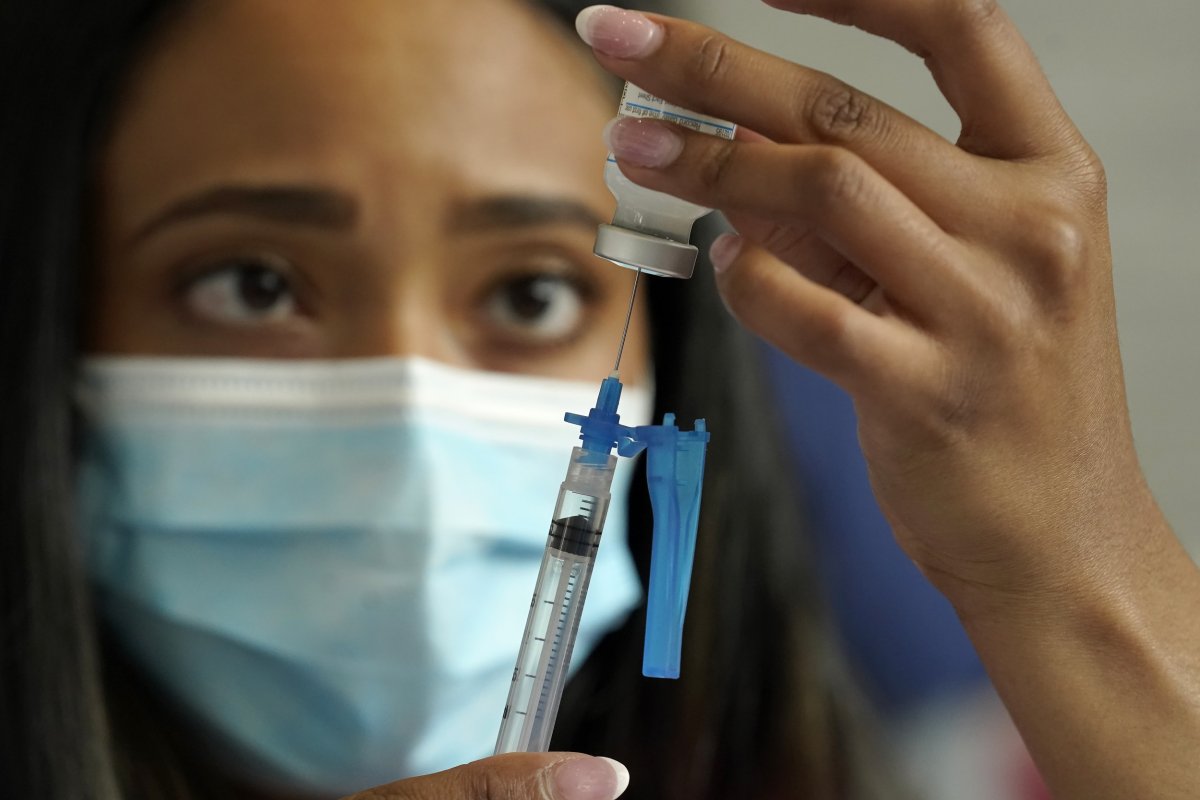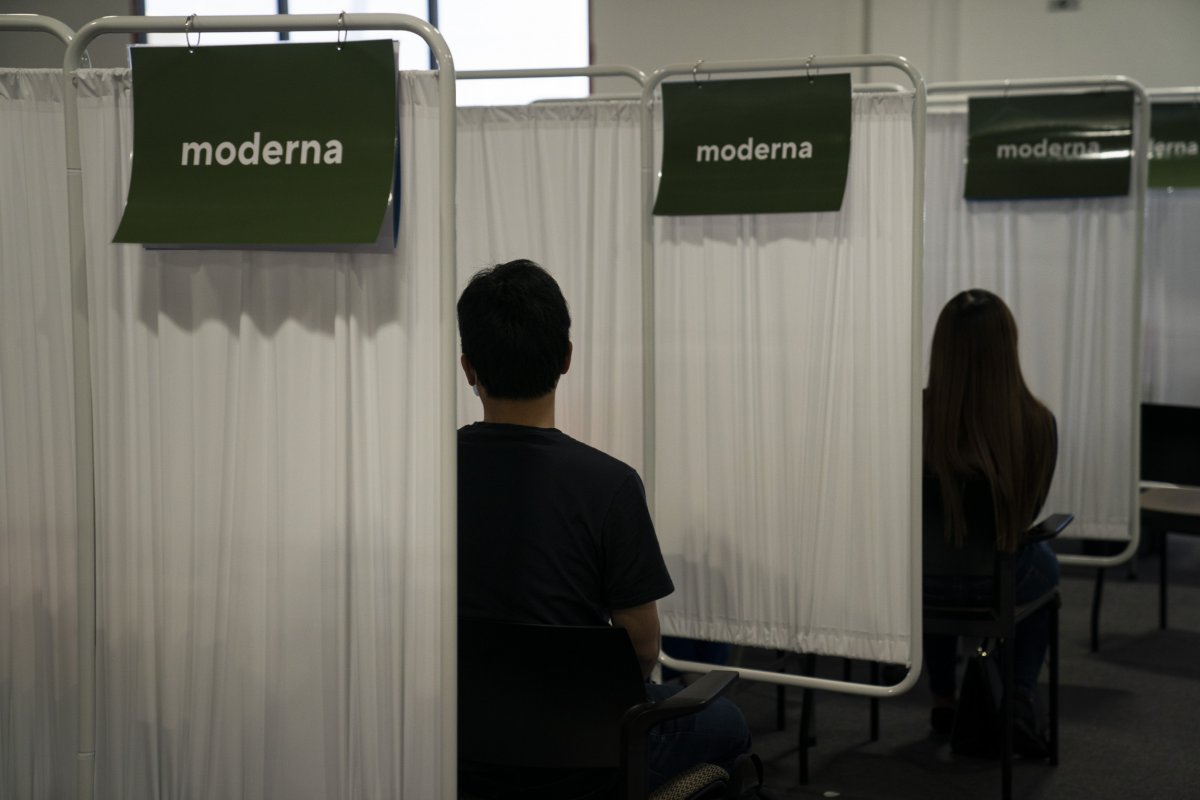As the Food and Drug Administration's independent advisers are set to begin considering booster shots from COVID-19 vaccine manufacturers other than Pfizer, Moderna is recommending that healthy Americans receive half the dose of its regular vaccine shot, the Associated Press reported.
The first two Moderna doses inject recipients with 100 micrograms of the vaccine, but the company says that just 50 grams in a booster should be sufficient.
Moderna conducted a study with 344 people, all of whom received a shot with 50 micrograms six months after their second vaccine dose. The company said that recipients saw a jump in virus-fighting antibodies, as well as a 42-fold increase in antibodies that can battle the Delta variant of the virus, the AP reported.
The study subjects saw similar side effects as those commonly experienced after the second shot of the vaccine, including fevers and aches. The FDA's advisers on Thursday will begin considering the authorization of a third Moderna booster, as well as a booster for the one-dose Johnson & Johnson vaccine, per the AP.
For more reporting from the Associated Press, see below.

The final go-ahead for the two vaccine boosters is not expected for at least another week.
After the FDA advisers give their recommendation, the agency itself will make a decision on whether to authorize boosters. Then next week, a panel convened by the Centers for Disease Control and Prevention will offer more specifics on who should get them. Its decision is subject to approval by the CDC director.
The process is meant to bolster public confidence in the vaccines. But it has already led to conflicts and disagreements among experts and agencies.
For example, last month the CDC advisory panel backed Pfizer boosters at the six-month point for older Americans, nursing home residents and people with underlying health problems. But CDC Director Dr. Rochelle Walensky overruled her advisers and decided boosters should also be offered to those with high-risk jobs such as teachers and health care workers, adding tens of millions more Americans to the list.
Some health experts fear the back-and-forth deliberations are muddling the public effort to persuade the unvaccinated to get their first shots. They worry that the talk of boosters will lead people to wrongly doubt the effectiveness of the vaccines in the first place.
As the FDA's panel meets to review the Moderna and J&J vaccines, its decisions this time are likely to be even more complicated, with experts discussing whether a third Moderna shot should contain just half the original dose and what's the best timing for a second shot of the single-dose J&J vaccine.
The panel will also look into the safety and effectiveness of mixing-and-matching different brands of vaccine, something regulators have not endorsed so far.
An estimated 103 million Americans are fully vaccinated with Pfizer's formula, 69 million with Moderna's and 15 million with J&J's, according to the CDC. Regulators took up the question of Pfizer boosters first because the company submitted its data ahead of the other vaccine makers.
As for people who got the J&J vaccine, the company submitted data to the FDA for different options: a booster shot at two months or at six months. The company did not signal its preference.
J&J released data in September showing that a booster given at two months provided 94 percent protection against moderate-to-severe COVID-19 infection. The company has not yet disclosed patient data on a six-month booster, but early measures of virus-fighting antibodies suggest it provides even higher protection.
Even without a booster, J&J says, its vaccine remains about 80 percent effective at preventing COVID-19 hospitalizations in the U.S.
Scientists emphasize that all three vaccines used in the U.S. still offer strong protection against severe disease and death from COVID-19. The issue is how quickly, and how much, protection against milder infection may wane.
In one recent study, researchers compared about 14,000 people who had gotten their first Moderna dose a year ago with 11,000 vaccinated eight months ago. As the delta variant surged in July and August, the more recently vaccinated group had a 36 percent lower rate of "breakthrough" infections compared with those vaccinated longer ago.
Still, medical experts continue to debate the science and rationale for giving extra shots to those who already have significant protection.
The White House and its top medical advisers announced sweeping plans in August to offer boosters to nearly all adults, citing signs of waning protection and the then-surging delta variant. But they were rebuffed by many experts who said there is little data showing whether such broad use would stop breakthrough infections or curb the overall trajectory of cases.
While the FDA and CDC ultimately scaled back use of Pfizer boosters, Biden administration officials, including Dr. Anthony Fauci, have suggested that extra shots will eventually be recommended for most Americans.
They point to data from Israel showing lower rates of infections and severe disease among people who received a third Pfizer shot.
The FDA meetings come as U.S. vaccinations have climbed back above 1 million per day on average, an increase of more than 50 percent over the past two weeks. The rise has been driven mainly by Pfizer boosters and employer vaccine mandates.

Uncommon Knowledge
Newsweek is committed to challenging conventional wisdom and finding connections in the search for common ground.
Newsweek is committed to challenging conventional wisdom and finding connections in the search for common ground.
About the writer
Zoe Strozewski is a Newsweek reporter based in New Jersey. Her focus is reporting on U.S. and global politics. Zoe ... Read more
To read how Newsweek uses AI as a newsroom tool, Click here.








